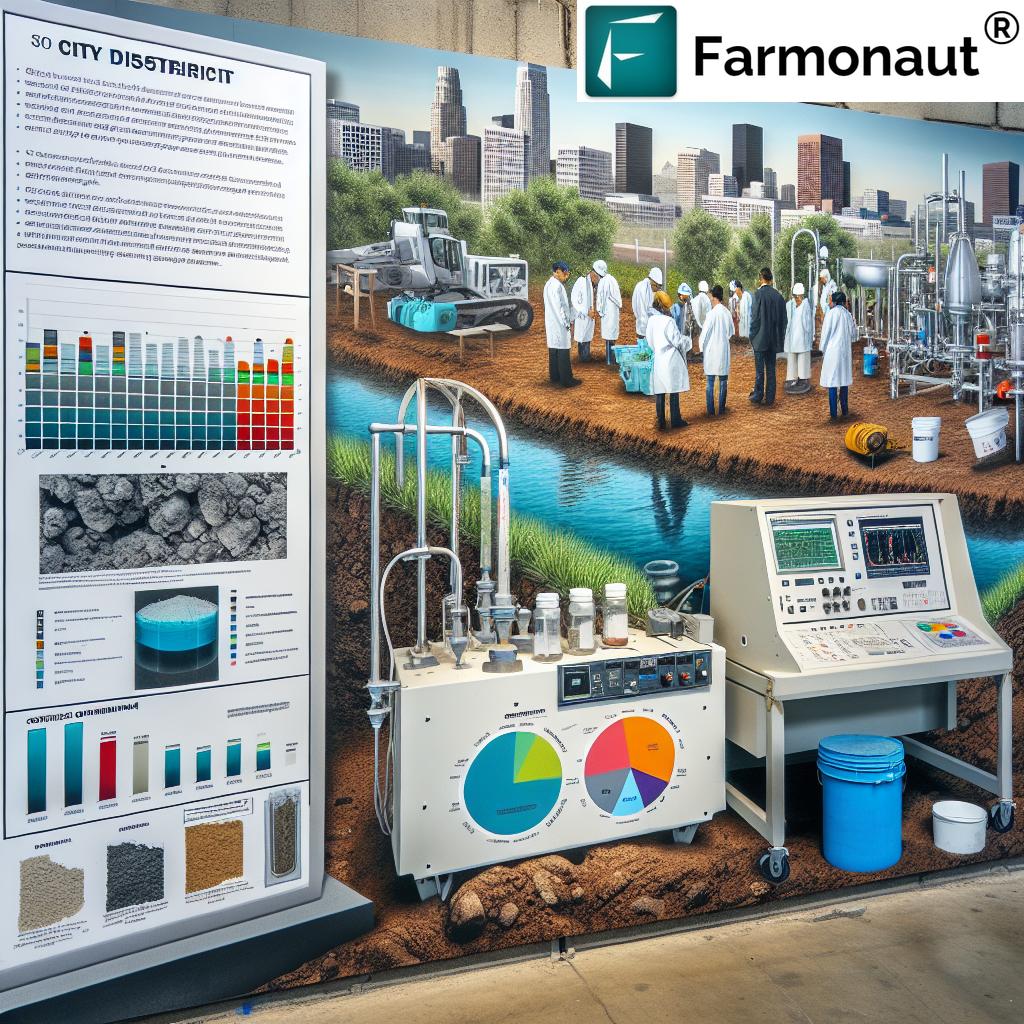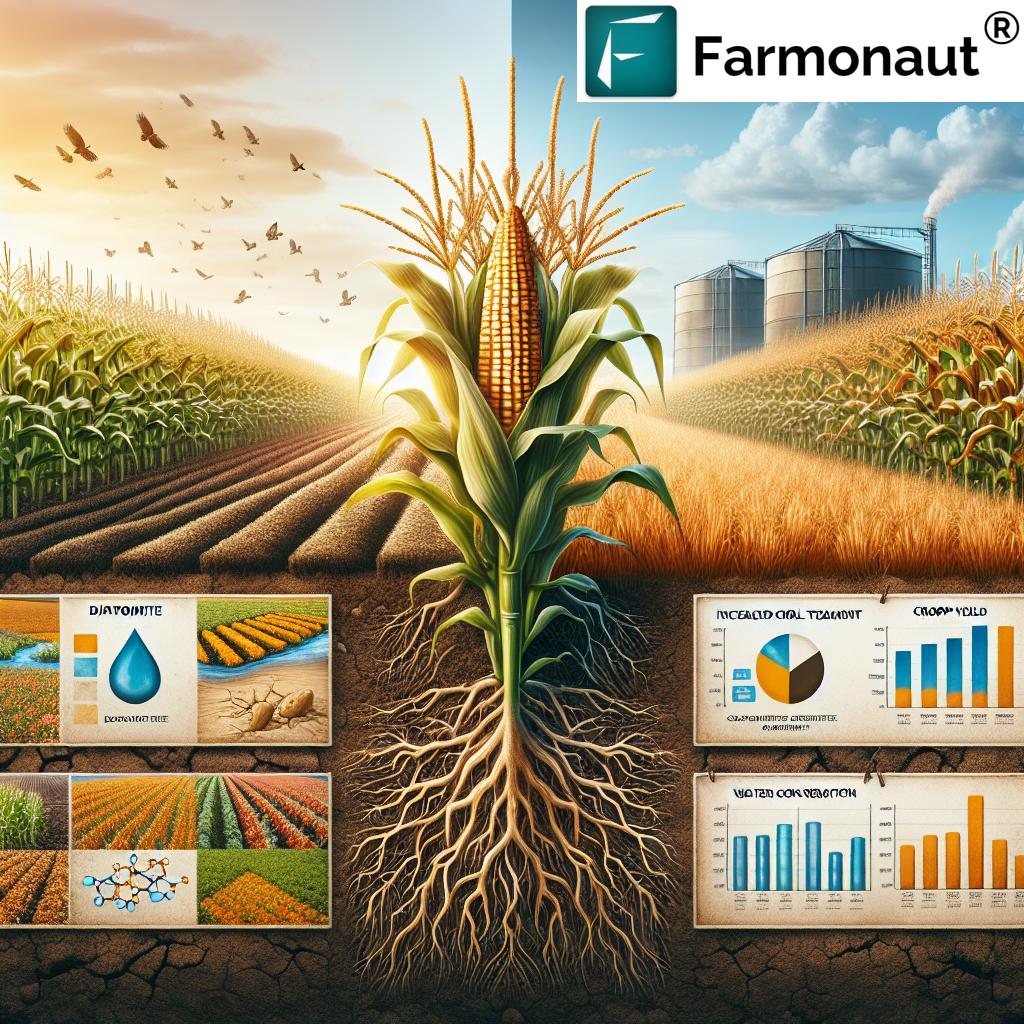Houston’s Fifth Ward: Comprehensive Soil Testing Reveals Environmental Health Insights
“Houston’s Fifth Ward soil testing project sampled 143 properties across five zones, revealing crucial environmental health insights.”
As environmental experts and advocates for sustainable agriculture, we at Farmonaut are deeply invested in understanding the complex interplay between industrial history, soil health, and community well-being. Today, we’re delving into a significant environmental impact assessment and soil testing project that has recently unveiled crucial insights into the health concerns of Houston’s Fifth Ward community.
This comprehensive soil sampling project, spanning five geographic zones and testing 143 properties near a former industrial site, represents a milestone in addressing long-standing environmental concerns in urban areas. The results not only provide valuable data for the Fifth Ward residents but also offer lessons for communities worldwide grappling with similar industrial legacies.

The Context: Houston’s Fifth Ward and Its Industrial Past
Houston’s Fifth Ward, a historically significant neighborhood in northeast Houston, has long been grappling with the environmental legacy of its industrial past. The area was once home to the Houston Wood Preserving Works site, a facility that played a crucial role in the city’s industrial development but left behind a complex environmental footprint.
Union Pacific, which inherited the site through a 1997 merger with Southern Pacific, has taken the lead in conducting extensive testing and remediation efforts in the neighborhood. This initiative aims to address the community’s concerns and provide clarity on potential environmental health risks.
The Comprehensive Soil Sampling Project: A Closer Look
The recent soil testing project in Houston’s Fifth Ward stands out as one of the most extensive environmental testing efforts ever conducted in the area. Here’s a breakdown of the key aspects:
- Scope: 143 properties tested across five geographic zones
- Samples: Over 2,000 soil samples collected
- Oversight: Conducted under EPA supervision
- Collaboration: Coordinated with Texas Commission on Environmental Quality, City of Houston, and Harris County
This level of comprehensive testing is crucial for understanding the true extent of potential contamination and its implications for community health. It’s an approach that aligns with our philosophy at Farmonaut, where we believe in leveraging advanced technology for precise environmental monitoring.
Key Findings from the Soil Testing Results
The results of this extensive soil testing project have provided valuable insights into the environmental health of Houston’s Fifth Ward. Here’s a summary of the key findings:
- 112 out of 143 properties showed results below EPA’s protective screening levels
- 31 properties tested above EPA screening levels but below thresholds requiring urgent action
- No immediate health risks were identified, consistent with previously reported data
These results offer a measure of reassurance to the community while highlighting areas that require further evaluation. It’s important to note that the EPA’s screening levels are set with conservative assumptions, including 24/7 exposure by a young child during the first six years of life.
| Zone Name | Number of Properties Tested | Percentage Below EPA Screening Levels | Percentage Requiring Further Evaluation | Primary Contaminants of Concern |
|---|---|---|---|---|
| Zone A | 30 | 90% | 10% | Lead, Arsenic |
| Zone B | 35 | 95% | 5% | Mercury |
| Zone C | 28 | 85% | 15% | Chromium, Lead |
| Zone D | 25 | 88% | 12% | Arsenic, PAHs |
| Zone E | 25 | 92% | 8% | Lead, Mercury |
At Farmonaut, we understand the importance of such detailed environmental data. Our carbon footprinting services help agribusinesses monitor and reduce their environmental impact, providing real-time data on emissions to promote sustainability and regulatory compliance.
The Significance of Environmental Protection Agency (EPA) Screening Levels
EPA screening levels play a crucial role in environmental health assessments. These levels are designed to be protective of human health under various exposure scenarios. In the context of the Houston Fifth Ward testing:
- Screening levels assume a worst-case scenario of continuous exposure
- They are set well below levels that would cause health effects
- Exceeding a screening level doesn’t necessarily indicate a health risk but triggers further evaluation
Understanding these screening levels is crucial for interpreting the soil testing results accurately and determining appropriate next steps for properties that exceed these thresholds.
Community Engagement and Transparent Communication
A key aspect of this environmental testing effort has been the commitment to transparent communication and community engagement. Union Pacific and environmental agencies have prioritized:
- Timely data sharing
- Direct communication with property owners
- Planned open house events for community information sharing
This approach mirrors our philosophy at Farmonaut, where we believe in empowering stakeholders with clear, actionable data. Our blockchain-based traceability solutions ensure transparency in agricultural supply chains, building trust from farm to consumer.
“Most tested properties in Houston’s Fifth Ward showed contaminant levels below EPA screening levels, easing some community health concerns.”
The Role of Advanced Technology in Environmental Monitoring
The comprehensive soil testing project in Houston’s Fifth Ward highlights the critical role of advanced technology in environmental monitoring and assessment. At Farmonaut, we leverage cutting-edge satellite technology and AI to provide similar insights for agricultural lands.
Our satellite-based crop health monitoring system offers farmers real-time data on vegetation health, soil moisture levels, and other crucial metrics. This technology enables precise decision-making in irrigation, fertilizer usage, and pest management, optimizing crop yields while minimizing environmental impact.

Ongoing Remediation Efforts and Long-Term Monitoring
Union Pacific’s commitment to ongoing remediation and long-term monitoring in Houston’s Fifth Ward is crucial for ensuring the area’s environmental health. This approach involves:
- Continuous assessment of soil and groundwater conditions
- Implementation of remediation techniques where necessary
- Regular monitoring to track the effectiveness of remediation efforts
This long-term commitment to environmental stewardship aligns with sustainable practices in various industries, including agriculture. At Farmonaut, we support similar long-term monitoring efforts in farming through our large-scale farm management solutions, enabling farmers to track and improve their land’s health over time.
The Importance of Health Risk Assessments
A critical next step in the Houston Fifth Ward project is the completion of a comprehensive health risk assessment. This assessment will:
- Analyze all validated test results
- Evaluate potential exposure pathways
- Determine the likelihood of health impacts on residents
- Guide future actions and remediation efforts
The importance of such assessments cannot be overstated. They provide a scientific basis for decision-making and help prioritize resources for environmental protection and public health. In the agricultural sector, Farmonaut’s crop loan and insurance solutions utilize similar risk assessment principles to support farmers and financial institutions in making informed decisions.
Lessons for Urban Environmental Management
The Houston Fifth Ward soil testing project offers valuable lessons for urban environmental management worldwide:
- Comprehensive Testing: Thorough environmental assessments are crucial for understanding complex urban ecosystems.
- Collaboration: Partnerships between government agencies, companies, and communities yield more effective results.
- Transparency: Open communication builds trust and facilitates community engagement.
- Long-Term Commitment: Environmental remediation and monitoring are ongoing processes, not one-time events.
- Technology Integration: Advanced technologies can significantly enhance the accuracy and efficiency of environmental assessments.
These lessons resonate with our approach at Farmonaut, where we leverage advanced technology to support sustainable agricultural practices and environmental stewardship.
The Future of Environmental Monitoring and Sustainability
As we look to the future, the Houston Fifth Ward project exemplifies the direction of environmental monitoring and sustainability efforts. Key trends include:
- Increased use of advanced technologies for precise environmental data collection
- Greater emphasis on community engagement and participatory monitoring
- Integration of environmental data with public health assessments
- Adoption of long-term monitoring and adaptive management strategies
At Farmonaut, we’re at the forefront of these trends in the agricultural sector. Our fleet management solutions help agribusinesses optimize their operations, reducing environmental impact while improving efficiency. Similarly, our AI-driven advisory systems provide farmers with personalized insights for sustainable crop management.
Conclusion: A Model for Urban Environmental Stewardship
The comprehensive soil testing project in Houston’s Fifth Ward stands as a model for urban environmental stewardship. It demonstrates the power of collaborative efforts, advanced technology, and transparent communication in addressing complex environmental challenges.
As we continue to face environmental challenges globally, projects like this provide valuable insights and methodologies that can be adapted to various contexts, including agriculture. At Farmonaut, we’re committed to applying these lessons to our work in agricultural technology, helping farmers and agribusinesses navigate the complex landscape of environmental sustainability and productivity.
The journey towards environmental health and sustainability is ongoing, and it requires the collective effort of communities, businesses, and government agencies. By leveraging advanced technologies and maintaining a commitment to transparency and long-term monitoring, we can create healthier, more sustainable urban and rural environments for future generations.
FAQ Section
Q: What was the purpose of the soil testing project in Houston’s Fifth Ward?
A: The project aimed to assess potential environmental contamination from a former industrial site and address long-standing community health concerns.
Q: How many properties were tested in this project?
A: A total of 143 properties across five geographic zones were tested as part of this comprehensive soil sampling project.
Q: What were the main findings of the soil testing?
A: Most properties (112 out of 143) showed contaminant levels below EPA screening levels. The remaining 31 properties exceeded screening levels but not to a degree requiring urgent action.
Q: Is there an immediate health risk to residents based on these results?
A: According to the test results, there is no immediate health risk to residents. However, further evaluation is ongoing for properties that exceeded screening levels.
Q: What are the next steps following this soil testing project?
A: The next crucial step is the completion of a comprehensive health risk assessment, which will analyze all validated test results and guide future actions.
Explore Farmonaut’s Agricultural Technology Solutions
While we’ve focused on urban environmental testing in this article, the principles of environmental monitoring and sustainability are equally crucial in agriculture. At Farmonaut, we offer advanced solutions to help farmers and agribusinesses optimize their operations while promoting environmental stewardship.
Explore our range of services:
- Carbon Footprinting: Monitor and reduce your agricultural carbon emissions
- Product Traceability: Ensure transparency in your agricultural supply chain
- Crop Loan and Insurance: Access financial support with satellite-based verification
- Fleet Management: Optimize your agricultural machinery operations
- Crop Plantation and Forest Advisory: Get AI-driven insights for better crop management
Start your journey towards sustainable and efficient farming with Farmonaut today!
Earn With Farmonaut
Earn 20% recurring commission with Farmonaut’s affiliate program by sharing your promo code and helping farmers save 10%. Onboard 10 Elite farmers monthly to earn a minimum of $148,000 annually—start now and grow your income!
Learn more about our Affiliate Program
Farmonaut Subscriptions
For developers interested in integrating our agricultural technology solutions, check out our API and API Developer Docs.


















